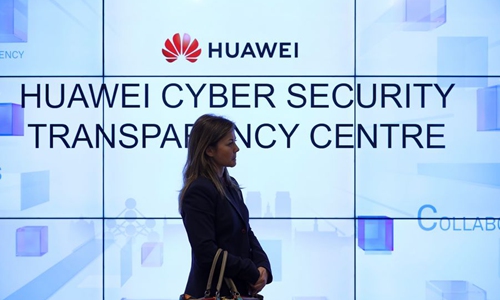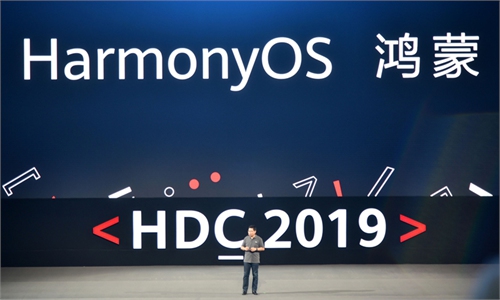Huawei a target for US, UK after National Security Law for HK is enacted
US, UK target Huawei in response to legislation

A woman listens to a debate at Huawei Cyber Security Transparency Center in Brussels, Belgium, on Jan. 30, 2020.(Xinhua/Zhang Cheng)
Technology company Huawei has become a target for a few of Western countries to vent their "anger" at China, on heels of the enactment of the National Security Law for Hong Kong by the country's top legislature on Tuesday.
But the restrictions put on Huawei by the US and UK governments amount to "bluffing rather than biting", Chinese industry insiders said.
The US Federal Communications Commission (FCC) on Tuesday (US time) officially designated Huawei and ZTE as US' national security threats. Under this classification, US telecom operators are not allowed to use an $8.3 billion government subsidy program, known as the Universal Service Fund, to purchase, maintain or support any equipment or services provided by the two Chinese telecom giants.
In response, Chinese Foreign Ministry spokesperson Zhao Lijian said at a press briefing on Wednesday that banning US carriers from purchasing Huawei and ZTE products will not improve US cybersecurity, but it will have a serious impact on network services in its rural areas.
Zhao urged the US side to stop generalizing the concept of national security and provide a fair and non-discriminatory environment for Chinese companies.
UK Prime Minister Boris Johnson toughened rhetoric on Huawei on Tuesday too. He said he would protect British critical infrastructure from "hostile state vendors" as he expressed concern over a new security legislation for Hong Kong, according to media reports.
Neither Huawei nor ZTE had responded to interview requests by the Global Times as of press time.
"It is obvious that Huawei is caught in the crossfire between China and a couple of Western nations over the security law for Hong Kong," said Ma Jihua, a veteran industry analyst and close follower of Huawei, on Wednesday.
Ma said that a cluster of Western politicians always target Huawei because the company, as a global leader of telecom technology innovations, is often in the media spotlight. The politicians want to sling mud at Huawei and castigate the Chinese company, because they are "not happy" with the new security law enacted for Hong Kong.
More importantly, making Huawei a target seems "opportune" for the Western countries and doesn't cost them much, the analyst said.
"On the one hand, the Trump administration dares not make the Phase One trade deal to bargaining chips with Beijing. On the other hand, Chinese policymakers and Huawei itself have anticipated such a result from Washington," Ma explained.
Chinese observers said that the curbs on Huawei will not inflict much damage on its businesses, as the US has run out of cards to harm Huawei.
In terms of the UK side, analysts said the British government may just "say one thing but do another", as the Johnson administration prioritizes economic interests over playing political power games.
In late June, just days before the passage of the National Security Law for Hong Kong by China's NPC Standing Committee - a result that markets widely anticipated - the UK government approved Huawei's plan to build a 1 billion pound ($1.24 billion) chip research and manufacturing facility in England.


